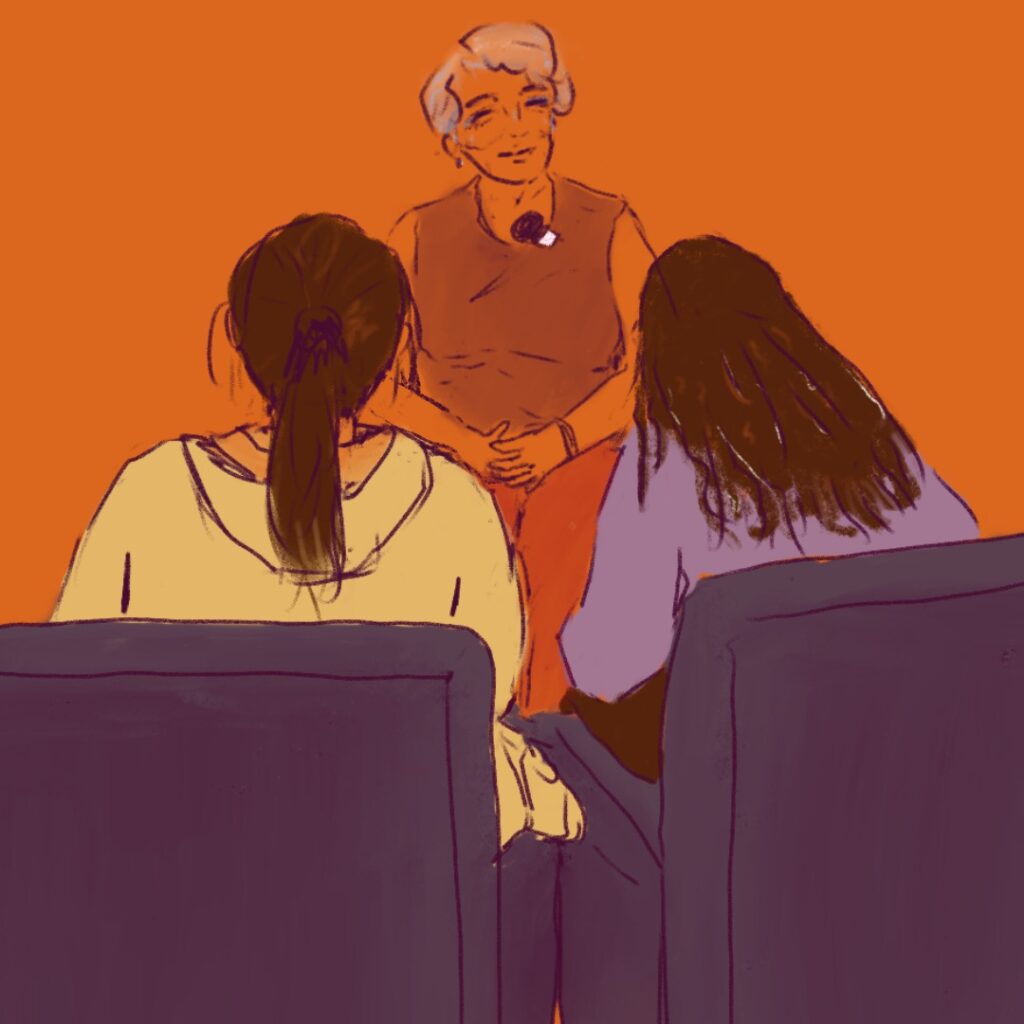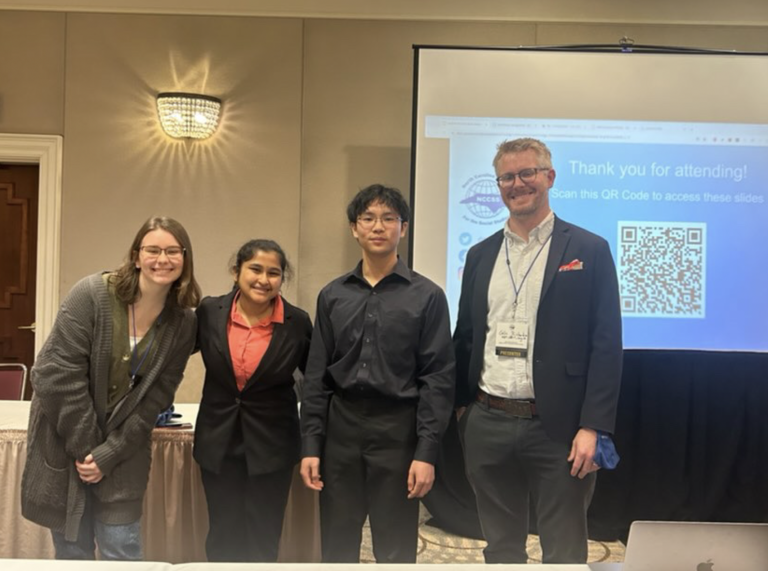This story is syndicated from The Green Hope Falcon, the newspaper of Green Hope High School in Cary, NC. The original version of the story ran here.
When Akshara Sai Venkatesan (‘24) opened up her United States history textbook to research the history of Indian Americans, she was both surprised and disappointed to find a lack of relevant material. Since then, she piloted Green Hope’s first oral history project and increased student engagement with Asian American narratives. One such engagement was on Friday, Feb. 26, when over 120 students gathered in the Green Hope Media Center during lunch to listen to Dr. Janelle Wong speak on the topic of Asian American studies.
Green Hope social studies teacher Mr. Colin Richardson advises the initiative, known as the Asian American Oral History Project. In an interview with the GH Falcon, he touched on his inspiration for spearheading the project.

“I’ve been running the Asian American Oral History Project this year to try and address the gap between our student population (38% Asian American) and broader curricula, which don’t traditionally center Asian American perspectives,” he said. “This is an opportunity to gather and share stories from our community, challenge students to put scholarship into action, and create change.”
Although the project was initiated in the 2023-2024 school year, the preparation began over the summer. “I’ve been in communication with the UNC Asian American Center (AAC) since last summer. In addition to attending events to make our project successful, I’ve worked with them multiple times to refine and develop this project. They were, for instance, extremely helpful in connecting us to the specialist on Oral Histories focusing on Asian Americans who came and trained our group,” Mr. Richardson said.
Associate Director of the UNC-Chapel Hill Asian American Center Mr. Kevin Kim highlighted the importance of compiling oral archives “I think there’s a beauty to that, that oral history captures, that is then for the people who are listening to researchers who then are able to think about that data, so to speak in new and different ways,” he said.
Mr. Kim shared his appreciation for oral history, both in of itself and as a tool to contextualize survey data that researchers like Dr. Wong use, despite garnering criticism towards its reliability as a sole source of information. “[A]s someone who manages oral history projects, that is the end goal for me at least, is to get people talking about their own experiences, and why and how and if the histories that you read about in books don’t match up with the histories that you felt, right, your memories, your way of thinking about events,” he said.
“I think that’s the beauty and also the perils of oral history. You can’t rely on oral history for facts. You always have to think about oral histories in context of other different ways.”
— Kevin Kim, Associate Director at the UNC Asian American Center
Green Hope student Akshara Sai Venkatesan (‘24) noticed the lack of representation of Asian Americans in her AP US History class. “Last year, for AP U.S. History we had final projects where we could do it on the history of anything, and I chose to do it on the history of Indian Americans. One of the resources we could use was our textbook, but when I searched up ‘Indian Americans’ in the textbook there were zero results. Being an American of Indian origin, I was sad that there was no representation for someone like me,” she said.
Venkatesan, now the project’s student president, believes Dr. Wong’s presentation was a significant step in addressing this lack of representation. “She [Dr. Wong] basically deconstructed race and how it’s actually a social construct and it keeps changing…A lot of APUSH kids were listening to her. They gained the idea of how Asian Americans are viewed in US history and how they should change notions of race and what they think about race.”

The project was able to connect with Dr. Wong through the AAC. “The AAC was bringing Dr. Wong, director of Asian American Studies at the University of Maryland, to UNC and wanted to reach out to the broader community. Even though there are many schools closer, they knew of the good work we were doing and planned a visit just to see us, and I am thankful over 120 Green Hope students were able to hear her speak,” Mr. Richardson said.
University of Maryland Professor and Director of the Asian American Studies Program Dr. Janelle Wong researches Asian American politics and identity and identifies participatory research similar to the Asian American Oral History Project and Green Hope as a critical effort to bring underrepresented voices to the table.
“[T]here is a model that is very, very important, and it’s participatory action research, and that involves, like, if I’m studying an undocumented Asian population, then I would involve undocumented Asian Americans in that research. They would help design the questions, [and] that is a growing approach in academia,” Wong said.
Venkatesan hopes students were able to gain further appreciation for the role that Asian Americans played throughout history, despite the material not covered in conventional textbooks. “[I hope students gain] a newer understanding on what Asian Americans are, what their role in history has been and gain an idea of if they want to study this in college…You don’t have to be Asian American to learn about this.”
Currently, the project is pushing for greater Asian American representation in a broad variety of classes at Green Hope. “We’re working with a lot of teachers to hopefully incorporate more Asian American stuff into the curriculum. For example, adding an Asian American play or one written by an Asian American playwright,” Venkatesan said.
The group also plans to share the final collection of their efforts at an orchestra concert on May 23. “During that concert, the orchestra and choir will be collaborating on a piece that will include excerpts from the narratives students have gathered,” Mr. Richardson said. “It’s going to be a really beautiful culmination of everyone’s hard work and a valuable opportunity to share how students have incorporated their work into classes at Green Hope.”



